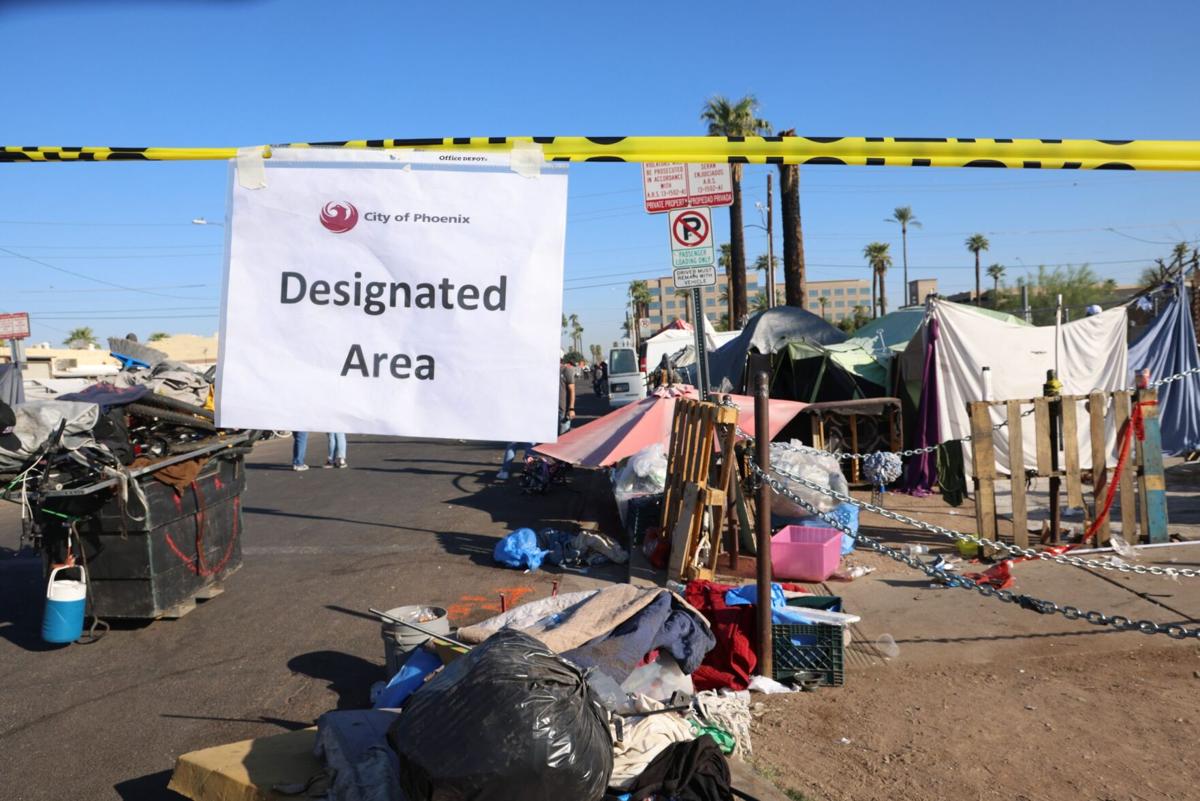PHOENIX — Arizona property owners could seek a property tax refund if their city, town or county failed to take steps to clear out encampments, stop panhandling or abate other nuisances created by homelessness, under a measure the Legislature wants voters to approve in November.
Republicans in the Senate voted Monday to place the measure on the ballot over objections from every Democrat. House Republicans approved the measure, sponsored by GOP House Speaker Ben Toma, last week, also with no support from minority Democrats.
If voters approve it, property owners will be allowed to apply for a refund if they can show they had expenses because a city, town or county had a policy of not enforcing, or failed to enforce, laws including illegal camping, loitering, panhandling, public urination or defecation, public consumption of alcoholic beverages or drug use.
“This bill … ensures that hardworking taxpayers will no longer be forced to bear the burden of the city’s refusal to do its duty to protect the public health and safety,’’ Toma, a Peoria Republican, said during a committee hearing on the measure last month.
Toma said his measure was prompted in part by a fight between the city of Phoenix and business owners whose property is near a homeless encampment known as “The Zone’’ a half-mile from the state Capitol. Business owners in the area sued Phoenix over what they said was a public nuisance and a judge sided with them last year and ordered Phoenix to clear out the area.
Sen. Justine Wadsack, R-Tucson, said residents in Pima County are living through a similar experience.
“There’s a running joke among the businesses in Tucson that we are The Zone,’’ Wadsack said during the February House committee meeting. “Tucson, the entire city, is a lot like The Zone here in Phoenix and we need help, the businesses need help.’’
Senate President Warren Petersen agreed the measure is needed.
“We all know homelessness has been overtaking once-beautiful cities all over this country,’’ the Gilbert Republican said when the measure was debated in a Senate committee.
“What it really boils down to is, when we have citizens who break laws, government has a lot of tools to go after citizens that don’t follow the law,’’ Petersen said. “But when our government doesn’t follow the law, or enforce our law, our citizens are limited on what they can do.’’
Lobbyists for counties and cities said they were constrained by federal court rulings that prevent them from clearing out encampments if there are not enough shelter beds to house those people.
Those rulings preventing many enforcement actions were issued by the 9th Circuit Court of Appeals, which covers Arizona and eight other states.
The U.S. Supreme Court agreed in January to consider those rulings that make it more difficult for Western cities to deal with people sleeping on the street when there are not enough shelter beds available.
The appeal the high court will take up was filed by officials in Grants Pass, Oregon, but is backed by Democratic California Gov. Gavin Newsom and governors from both parties who are struggling with their own homeless populations.
Sen. Priya Sundareshan, D-Tucson, urged her fellow senators to oppose the Arizona ballot effort, saying that removing funding from cities would make it harder for them to do what they can to address the homeless issue. She pointed to discussions that took place during a previous Senate committee hearing.
“We talked about all of the different things that cities use their funding for, that if you take away their funds might result in reduced services,’’ Sundareshan said during Monday’s Senate vote, “things like police and other very important needed city services.’’
“And so I’m so confused why we’re rushing to, in essence, defund the police when I know my colleagues on the other side have a problem with that,’’ Sundareshan added.
Still, the measure that voters will see in November is not as severe as first proposed.
The earlier version would have allowed landowners to receive payment for the decreased value of their property if cities did not deal with the homeless problem. But that was scrapped amid questions about potential costs.
The ballot referral is among at least 16 that are being considered in the Arizona Senate or House this year, many of which tackle “culture war’’ topics that have scant hope of being signed by Democratic Gov. Katie Hobbs.
Sending the issues to the voters bypasses Hobbs completely, since she cannot veto measures the Legislature sends directly to the ballot.
Sen. Ken Bennett, R-Prescott, said Monday he struggled with the bill and was concerned that business owners could apply to have years of back property taxes refunded. So he read into the record his belief that the Legislature only intended refunds of the most recent year of taxes before voting yes.
But it is an open question whether a court would agree with that interpretation of the language if voters approve the measure in November and it comes before a judge.
Get your morning recap of today's local news and read the full stories here: tucne.ws/morning





